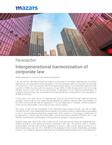
Intergenerational harmonization of corporate law
Law, like families, develops through generations. In the case of Colombian corporate law, it could be said that we are entering the fourth generation. The first took place with the enactment of the Code of Commerce in 1971; the second, with the comprehensive reform of the corporate regime through Law 222 of 1995; the third, with the issuance of Law 1258 of 2008, through which the S.A.S. was created; and the fourth, with the current process of discussion on the systemic transformation of corporate and insolvency law, promoted by the Superintendence of Corporations in the framework of its 80th anniversary.
In this sense, the major issues of corporate law must be harmonized through legal-generational changes. Failure to do so may create fissures between the different regimes where the protection of the value to be preserved may be jeopardized. This has happened, for example, with the protection of the minority shareholder in the context of spin-offs by creation.
The figure of spin-off was introduced in the Colombian legal system through Law 222 of 1995. Through this law, it was established that the assets of a company could be fragmented or segregated in one or more beneficiaries that were created (spin-off by creation) or that already existed (spin-off by absorption), in which case the shareholders, unless unanimously decided otherwise (art. 3, Law 222/95), would become shareholders of the beneficiary company in equal proportion.
Thirteen years later, when Law 1258 of 2008 (S.A.S. Law) was issued, Article 30 established that - "without prejudice of the special provisions contained in this law"- the general rules of mergers, transformation and spin-offs would be applicable to S.A.S.'s. Within these special provisions, it is worth mentioning a rule (art. 31, L. 222/95) for the protection of the minority shareholder, according to which "any company may be transformed into a simplified stock company, prior to its dissolution, provided that it is so decided by its assembly or board of partners, by unanimous decision of the associates owning all the subscribed shares". This rule, of fundamental importance, grants a veto to the minority shareholder of a company other than an S.A.S. to prevent that, by majority decision, the company of which it is a part from being transformed into a simplified stock company.
But, by virtue of the generational gaps that may occur due to the lack of harmonized corporate regulations, it may happen that within the framework of a spin-off of a company other than an S.A.S. (for example, a corporation), a spin-off project by creation is approved, by means of which business lines or commercial establishments are segregated in a simplified stock company. If in such operation there is a minority shareholder, who does not want to be associated under the corporate structure of an S.A.S. because he considers it risky, he would not have the veto to prevent it, since the operation would not come from a transformation but from a spin-off, which is approved by simple majority. In this case, the minority shareholder could be forced to be part of an S.A.S. and would have no other option but to exercise its right of withdrawal alleging that the spin-off imposes on the shareholders a greater liability or implies a deterioration of its patrimonial rights.
This specific case arose and was submitted to the consideration of the Commercial Proceedings Office of the Superintendence of Companies in 2013 (see judgment of Carlos Hakim Daccach vs. Gyptec S.A.). In such opportunity, said entity, when decreeing the absolute nullity of the decision adopted by the assembly of Gyptec S.A. consisting in the approval of the spin-off project, opted to fill the legal gap mentioned above by means of an exercise of legal integration known as "self-integration", which is given by resorting to the formal sources of the branch of law in question (in this case, corporate law) and resorting to analogy and general principles of law to fill the gap. The Office indicated that "(...) if in a corporation a total or partial spin-off is proposed in which the associates receive shares of an S.A.S. as consideration, the respective legal transaction must be approved by the favorable vote of all the shareholders of the spin-off company. Otherwise, the protection mechanism provided for in Article 31 of Law 1258 would be null and void, inasmuch as any of such parties could become a shareholder of an S.A.S. without having agreed to it, or even against their will".
This is one of the many existing examples of the fissures that can be created between the different generational regimes which, if not harmonized, would end up affecting the very values they protect. This should then be a task to take into account when presenting the bill that harmonizes, updates and integrates the different generations of corporate rules existing in Colombia.


